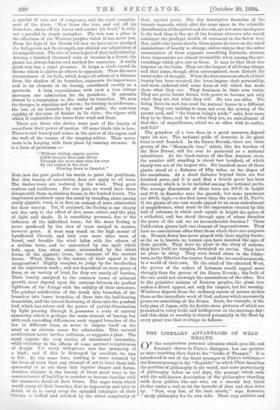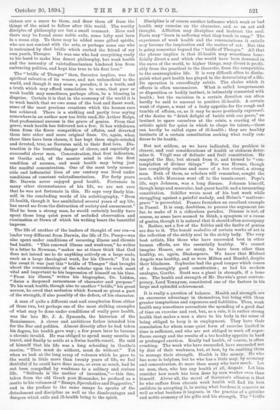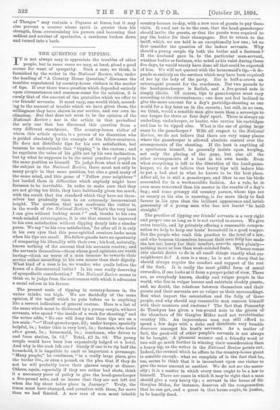THE LITERARY ADVANTAGES OF WEAK HEALTH.
OF the numberless personal allusions which give life and dramatic charm to Plato's dialogues, few are prettier or more touching than that to the "bridle of Theages." It is introduced in one of the finest passages in Plato's writings,— the famous passage in the "Republic" in which Plato describes the position of philosophy in the world, and more particularly of philosophy fallen on evil days, the passage which ends with the well-known description of the philosopher standing aside from politics like one who, on a stormy day, takes shelter under a wall to let the tornado of dust and sleet drive by. "Few, very few, of the best minds," says Soeratee, "study philosophy for its own sake. Their very abilities and
virtues are a snare to them, and draw them off from the things of the mind to follow after this world. The worthy disciples of philosophy are but a small remnant. Here and there may be found some noble exile, some lofty soul born in a mean city. To these may be added some gifted spirits, who are not content with the arts, or perhaps some one who is restrained by that bridle which curbed the friend of my own youth, Theages. He was one who had everything ready to his hand to make him desert philosophy, but weak health and the necessity of valetudinarianism hindered him from embracing politics, and kept him true to his first love."
The "bridle of Theages" then, Socrates implies, was the spiritual salvation of its wearer, and not unbeneficial to the world, and though it may seem a paradox, it is a truth, and a truth which may afford consolation to some, that poor or weak health may sometimes, perhaps often, be a blessing in disguise. Certain it is that in the economy of the world it is to weak health that we owe some of the best and finest work, some of the most precious creations which the human race has achieved. There is a striking and partly true Baying somewhere in an author now too little read, Sir Arthur Helps, that professional success is the grave of genius. From that grave, weak health has delivered not a few. It has withdrawn them from the fierce competition of affairs, and diverted them into other and more original lines. Or, again, when these lines have been chosen, it has kept them single-minded and devoted, true, as Socrates said, to their first love. Dis- traction is the besetting danger of clever, and especially of successful clever men. Concentration, that first indication, as Goethe said, of the master mind is also the first condition of success, and weak health may bring just the needful concentration. One of the most truly memor- able and influential lives of our century was lived under conditions of constant valetudinarianism. For forty years Mr. Darwin never enjoyed good health. Fortunate hi many other circumstances of his life, we are not sure -that he was not fortunate in this. He says very finely him- self, in the concluding words of his autobiography, "Even ill-health, though it has annihilated several years of my life, has saved me from the distraction of society and amusement." Had he been a strong man, he would certainly hardly have spent those long quiet years of secluded observation and rumination at Down of which his writing bears the beautiful -impress.
The life of another of the leaders of thought of our era—a leader very different from Darwin, the life of Dr. Pusey—was also spent under conditions of recurring illness and chronic bad health. "This renewed illness and weakness," he writes in a letter to Newman, "makes me at times think that God noes not intend me to do anything actively on a large scale, such as a large theological work, for his Church." Yet in -the event it was just this "bridle of Theagee" that brought about the concentration of the scholar upon the work most vital and important to his impression of himself on his time. 4‘ From his illness," writes his biographer, Dr. Liddon, 4‘ dates a deepened earnestness of character and purpose." To his weak health, though also to another "bridle," his great sorrow, he owed that seclusion which formed so great a part of the strength, if also possibly of the defect, of his character.
A man of quite a different cast and complexion from either these two, but perhaps one of the most striking examples of what may be done under conditions of really poor health, was the late Mr. J. A. Symonds, the historian of the Renaissance. A clever and ambitious father intended him for the Bar and politics. Almost directly after he had taken his degree, his health gave way ; a few years later he became a chronic invalid. He was obliged to spend many months in travel, and finally to settle at a Swiss health-resort. He said of himself that his life was a long schooling in Goethe's maxim, "Thou must do without, must do without." Yet when we look at the long array of volumes which he gave to the world in little more than twenty years of life, we feel doubtful if he could have done more, or even so much, had he not been compelled by weakness to a solitary and recluse life. "Solitude is the mother of invention,"— this line, taken from the old Greek poet Menander, he prefixed as a motto to his volumes of "Essays, Speculative and Suggestive," and in the preface to the same essays he speaks of the .detachment and discipline as well as the disadvantages and dangers Which exile and ill-health bring to the spirit. Discipline is of course another influence which weak or bad health may exercise on the character, and so on art and thought. Affliction may discipline and instruct the soul. Poets may "learn in suffering what they teach in song." The experience of weak health and the renunciations it entails may become the inspiration and the matter of art. But this is going somewhat beyond the "bridle of Theages." All that the phrase implies is that ill-health may sometimes bene- ficially direct a soul which else would have been drowned in. the cares of the world, to higher things, may divert it profit- ably from the practical to the theoretic, from the competitive to the contemplative life. It is very difficult often to distin- guish what part health has played in the determining of a life. Its operation is exceedingly subtle. The choice which it effects is often unconscious. What is called temperament or disposition or bodily instinct, is intimately connected with health ; but the variation in a certain direction can often hardly be said to amount to positive ill-health. A certain want of vigour, a want of a lusty appetite for the rough and tumble of affairs, or, as it may be more poetically expreseeeo of the desire to "drink delight of battle with our peers," an instinct to spare ourselves at the crisis, a craving of the artistic spirit for quiet in which to shape its talent,—these can hardly be called signs of ill-health ; they are healthy instincts of a certain constitution seeking what really con- duces to its health.
But not seldom, as we have indicated, the problem is clearer, and real considerations of health or sickness deter- mine it. Virgil was of delicate and frail constitution. He essayed the Bar, but shrank from it, and turned to "con- templation of diviner things." Nor was Horace, though less completely recluse and more of a bon vivant, a strong man. Both of them, as scholars will remember, sought the couch, while Mmcenas went off to the tennis-court. Pope's life, says Johnson, was a long disease. Johnson himself, though large and muscular, had queer health and a tormenting constitution. Schiller wrote most of his best work while struggling against a painful malady, and Heine's " mattress- grave " is proverbial. France furnishes an excellent example in Pascal. It is easy, doubtless, to pursue the argument too far, to make of it a ridiculous paradox. Disease is not, of course, as some have seemed to think, a symptom or a cause of genius, though it is natural that it should often accompany it. Rather, not a few of the foibles and the faults of genius are due to it. The beanie maladive of certain works of art is the reflection of the sickly soul in the sickly body. The very best artists, like those who have succeeded best in other human efforts, are the essentially healthy. We cannot imagine Homer, one or many, to have been other than healthy, or, again, Shakespeare. We know that Michael Angelo was healthy, and so were Milton and Handel, despite their blindness. Sophocles bad the good temper which comes of a thoroughly good constitution ; so had his modern analogue, Goethe. Scott was a giant in strength, if a lame one. The health and strength of Mr. Darwin's great eontem- porary, Lord Tennyson, constituted one of the factors in his large and splendid achievement.
It is really a question of balance. Health and strength are an enormous advantage in themselves, but bring with them greater temptations and exposures and liabilities. Thus, weak health may sometimes necessitate the spending of a good deal of time on exercise and rest, hut, as a rule, it is rather strong health that makes a man a slave to his body in the sense of being obliged to keep it in employment. They have their consolation for whom some quiet form of exercise limited in time is sufficient, and who are not obliged to work off super- fluous energy and the results of a too healthy appetite in hard or prolonged exertion. Really bad health, of course, is often crushing. The weak who have succeeded, have succeeded not by dint of their weakness, but, at best, by its enabling them to manage their strength. Health is like money. He who has none is helpless, but he who has a little may, by economy and concentration, do more than many who have much. Let no man, then, who has any health at all, despair. Let him consider how much has been done by men weaker even than himself. Above all, the moral of Socrates's allusion is that be who suffers from chronic weak health will find his best antidote in accepting it, in seeing what burdens it removes as well as what burdens it imposes, in the practice of a genuine and noble economy of his gifts and his strength, The "bridle of Theages " may restrain a Pegasus at times, but it may also prevent a courser whose spirit is greater than his strength, from overstraining his powers and becoming that saddest and sorriest of spectacles, a racehorse broken down and turned into a hack.






































 Previous page
Previous page